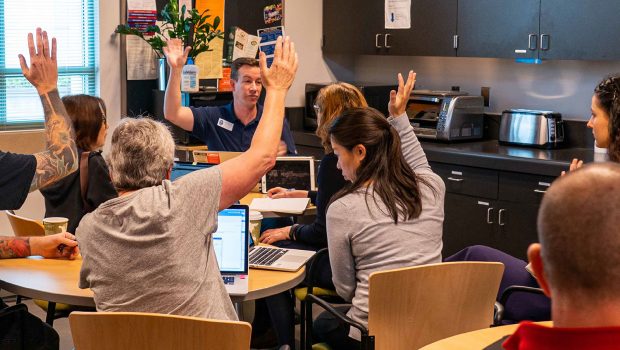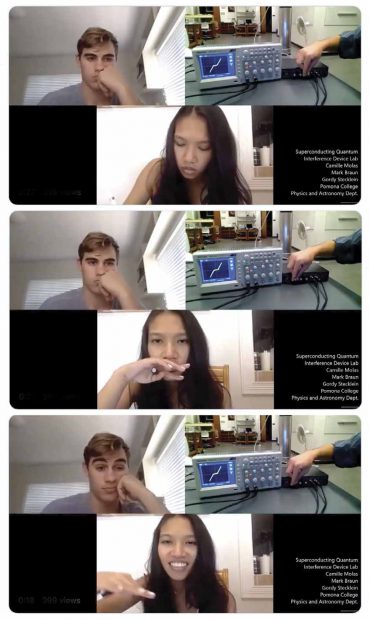
Pomona faculty take part in a workshop on remote instruction.
Pomona vs. the Pandemic Part 2
Part 1: Pomona vs. the Pandemic
Part 3: Bittersweet 16
Part 4: Job-Hunting in the Pandemic
Part 5: Sagehens on the Front Lines
THE LAST DAY of March in the year 2020 will be remembered as the day when Pomona College’s curriculum entered a virtual new world.
By then, most students had already moved off campus, and most staff and faculty had begun to work from home. During a prolonged spring break, professors and staff had worked furiously to shift the curriculum temporarily to online instruction. Leading up to the virual relaunch, the College’s Information Technology Services (ITS) had held countless workshops to guide members of the faculty in the use of a range of online tools, provided laptops to students and everything from tablets to video cameras to faculty. Professors had also spent the time reviewing course plans, seeking the best way to communicate content and create interaction online.

Physics Professor Gordy Stecklein and his Physics 174 students Mark Braun ’21 and Camille Molas ’21 in a Zoom class.
The result was a reliance on multiple approaches and technologies as professors sought to move online in the way best suited to their content and teaching style. “Our faculty have been experimenting with pedagogical techniques like flipped classrooms, where they record their lectures in advance,” Assistant Professor of Computer Science Alexandra Papoutsaki wrote, “while others have been trying different setups for real-time class meetings. Some have brought mini whiteboards home, some have been trying document-cameras so that they can project what they write on paper in real-time, and others are using set-ups like mine, switching between laptops and tablets.”
Professors also reached out to their students, both to touch base and to prepare for the resumption of classes. “Because I am aware that people’s transitions have varied quite a bit in smoothness and results,” Associate Professor of Psychological Science and Africana Studies Eric Hurley noted, “the very first concrete thing I did was to ask all my students to ‘please do let me know in an email if there are things about your particular situation that you think I need to know and consider as I try to support your navigating the remainder of the course in balance with life.’ Of course, the College has been consistent in its offers of technical and other support, but I figured that some issues and difficulties are kind of particular and that they can only be troubleshot as they come up. In fact, I did have a few responses to that, ranging from how virtual meetings might interact with students’ accommodations to the challenge of focusing on coursework while living in a small space housing a large number of people.”
Some professors chose not to try to recreate the classroom experience, moving instead to more individualized research. Associate Professor of Sociology Colin Beck explained, “Both of my seminars were already planned to transition into student-focused work—discussions on topics that they were interested in, longer research papers, peer workshops on drafts, etc. It’s not possible to recreate the magic of those discussions online, but it is quite easy to move the research process into Sakai discussion forums and Zoom office hours. So, for both classes, I have excised the minimal post-spring break “content” in favor of having students focus on their own research.”
Some classes and disciplines offered greater challenges than others. Science classes with hands-on laboratories were forced to take on new forms. Professor of Physics Janice Hudgings reported: “For labs, we’ve switched from actually building the circuits with a breadboard to ‘building’ the circuits in an online circuit simulator, which allows us to do all the same measurements that we would have in the lab. The circuit simulator is a useful new tool that we wouldn’t have learned without this shift to online teaching—so that’s a nice win!”
Music faculty did their best to meet all the complexities of guiding ensembles and individual lessons in such dispersed wide-ranging settings. “Applied lessons—one-on-one instruction on an instrument or voice—are going forward,” wrote Professor of Music Donna Di Grazia, “but it is taking herculean efforts to do so. Many students had borrowed instruments on campus from the department, which is now making arrangements to rent instruments at the department’s expense and have them delivered to as many of these students as possible. The logistics of doing this are complex, and students also face challenges doing lessons or practicing with parents and siblings home, “and there is nowhere one can retreat and practice without distractions or without distracting everyone else.”
Several faculty members praised the work and dedication of the ITS staff for accomplishing so much so quickly. Professor of Geology Eric Grosfils wrote: “The end-to-end development and testing of the Virtual Server by ITS was amazing and deserves a special call-out. This is something that would normally happen over many months; ITS did it in roughly two weeks. Without this capability, a big hunk of my computing-heavy course would be dead in the water. As it stands, I simply have to help my students adapt to a new way to access that computing!”
As at most of the nation’s top colleges and universities, after a long debate and consultation with students, in recognition of the differing situations of students in completing their work after the campus was closed, Pomona’s faculty voted to adopt a special grading policy for that semester. As a result, for spring 2020, students’ transcripts will show only grades of P (pass), NRP (no report, pandemic) or I (incomplete). No letter grades were to be recorded. In addition, student transcripts will bear the notation “COVID-19: Enrollment and grades reflect disruption of Spring 2020.”
After delaying the decision as long as possible, the College also determined that it would be unsafe to hold the usual Commencement exercises on campus for the Class of 2020, so after consulting with members of the class about their preference, the College announced that Commencement 2020 would be postponed until some as yet undetermined future date when it would be safer for the new graduates to return to campus to celebrate together the end of their four-year educational journey.
